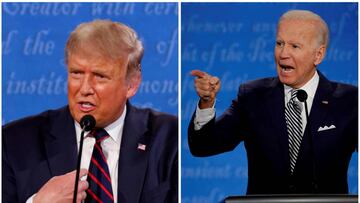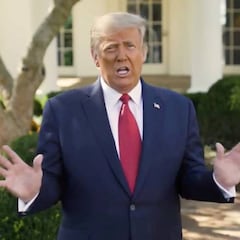USA Election 2020: why has Donald Trump refused to take part in a virtual debate?
The CPD has called for the second presidential debate to be held remotely but the President has rejected the offer, calling it a "waste of time".


Donald Trump has refused to take part in a second presidential debate with Democratic nominee Joe Biden if it is to be held virtually. The debate was scheduled to take place in Miami on the 15 October but that looks extremely unlikely to go ahead after the President’s positive Covid-19 test.
Trump rejected a virtual debate with Biden for Oct. 15, but his campaign said it was open to participating in person a week later. Biden instead booked a solo town-hall-style event for next week https://t.co/zHNuwnABc5 pic.twitter.com/VBt1BmeHdT
— Reuters (@Reuters) October 9, 2020
Trump is claiming that he is no longer contagious but the secrecy surrounding the President’s recovery from coronavirus means that a second face-to-face debate seems highly unlikely. The President’s team have repeatedly refused to say when he last tested negative and there are questions about when he first contracted the virus.
The low-down on the final presidential debate.
What did the President say about the prospect of a virtual debate?
With the President behind in the polls a second debate, even one held remotely, would give him a much-needed opportunity to claw back some swing voters. But when the Commission on Presidential Debates announced that the Miami showdown would be held "from separate remote locations... to protect the health and safety of all involved”, Trump reacted angrily, telling Fox News that it was “not acceptable”.
"I'm not going to waste my time on a virtual debate, that's not what debating is all about”, said the President on a live telephone interview.
"You sit behind a computer and do a debate? That's ridiculous. And then they cut you off whenever they want."
Why did Trump refuse to do the second debate remotely?
Trump’s concern about being cut off by debate organisers is particularly interesting given the chaotic nature of the first presidential debate. He interrupted Biden 73 times in the 90-minute debate and some called for the introduction of a ‘mute bottom’ in the aftermath of the Utah debate.
The Commission on Presidential Debates issued a statement after the first debate saying that it was “clear that additional structure should be added to the format of the remaining debates to ensure a more orderly discussion of the issues.”
"The White House’s approach to avoiding accountability for its record is becoming clearer than ever: to distract, interrupt and even blow up debates that might focus attention on Mr. Trump’s handling of the virus and other issues," writes Lisa Lerer. https://t.co/zFjXb4g8dq
— The New York Times (@nytimes) October 9, 2020
This would likely disrupt the President’s game plan going into the all-important final debate as he seemed intent on disrupting proceedings during the first. The switch to a virtual debate would probably see things play out in a more orderly fashion with candidates unable to speak over each other.
Who are the Commission on Presidential Debates?
The CPD was set up in 1987 under the joint sponsorship of both main parties to organise and run presidential and vice presidential debates. It has overseen every set of debates since 1988 and is currently led by Frank Fahrenkopf, a former Republican National Committee chairman.
Mike McCurry, a former CPD co-chairman and President Clinton’s White House press secretary, told the Wall Street Journal that one of the commission’s greatest strengths is that it has made it difficult for candidates to skip debates that put them at a disadvantage.
“It pretty much has standardized these debates, and it would be very difficult now for a candidate to say, ‘I’m just not going.'"
Related stories
Candidates have no legal obligation to attend and the unique circumstances of this year’s presidential race make it unlike any year under the CPD’s control.
As Donald Trump and Joe Biden's campaigns spar over virtual debate plans, take a look at John F. Kennedy and Richard Nixon facing off each other in a long-distance debate in 1960, live from opposite American coasts pic.twitter.com/WirguNdErP
— Reuters (@Reuters) October 9, 2020
The only other ‘virtual’ debate in American general election history took place 60 years ago, when the third presidential debate between John F. Kennedy and Richard Nixon was held with the two candidates 3,000 miles apart. Kennedy narrowly won the election and a later survey found that over half of all voters felt they had been influenced by the televised debate.

